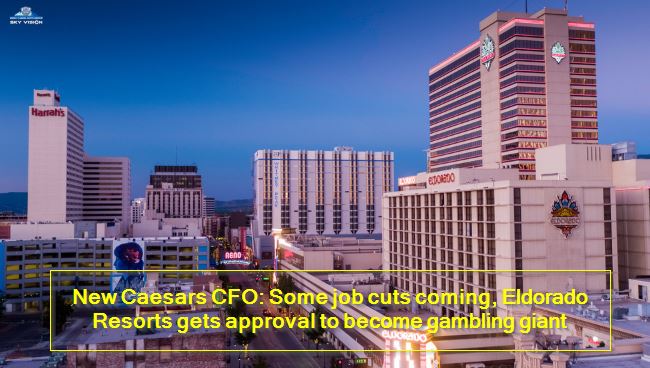New Caesars CFO: Some job cuts coming, Eldorado Resorts gets approval to become gambling giant
The merger of Eldorado Resorts and Caesars Entertainment Corp. will result in a reduction of jobs, but the new company plans to make cuts as “compassionately and transparently as possible,” Chief Financial Officer Bret Yunker said.
Yunker, who served as CFO with Eldorado and now with the new Caesars Entertainment Inc., wasn’t specific about how many jobs would be eliminated or where the reductions would happen.
Before layoffs resulting from the coronavirus pandemic, Caesars had about 30,000 employees in Las Vegas and about 65,000 worldwide. Eldorado had about 18,000 workers.
“We remain focused on creating substantial synergies as we bring together these two companies,” Yunker said. “That will, unfortunately, result in some job reductions. Reducing the size of a workforce is always challenging to go through. We commit to do that as compassionately and transparently as possible.”
Eldorado, a Reno-based company, announced Monday it had completed the $17.3 billion deal to acquire Caesars, making it the biggest gaming company in the world. The merged company owns and operates more than 55 casinos in 16 U.S. states, including eight resorts on the Las Vegas Strip.
Yunker said he hoped the “strength of the combined portfolio” would help the company continue to reopen casinos shuttered during the pandemic.
[amazon box=”B07H97FRX5″ “small”]
In Nevada, Gov. Steve Sisolak ordered all casinos closed in mid-March to help curb the spread of the virus. They were allowed to start reopening June 4.
“We have Bally’s coming open later this week (Thursday), so we’ve been doing whatever we can to open properties in Las Vegas and in Nevada to help bring employees back to work,” Yunker said.
Two other Caesars properties on the Strip, Planet Hollywood and the Cromwell, remain closed. The Rio, just west of the Strip, has also not resumed operations.
While the coronavirus has wreaked havoc on the tourism industry, decimating casino revenues, Yunker said Eldorado never thought about backing away from the deal.
“When you’re in that scenario, you have to think of everything, but we never paused,” Yunker said. “The strategic rationale of the merger, in any scenario, was always going to make sense to us.
“In the interim, it’s going to be challenging,” Yunker said. “Once we get to the other side of this, Las Vegas is as unique as it gets. We’re totally bullish on Las Vegas.”
The company has about $13 billion in debt, along with additional obligations to VICI Properties and another real estate investment trust, Yunker acknowledged.
But both companies “came into the merger pretty under-leveraged, which was good,” Yunker said. “Yes, there is some incremental leverage as part of the transaction, but, having been around the industry and executed hundreds of gaming credit transactions, I saw a battleship portfolio that will generate cash flows through thick and thin.
“We also created an abundance of liquidity to deal with any operational uncertainty in the near term. Our portfolio of properties, balance sheet and liquidity are going to see us through to the other side,” he said.
As Eldorado officials have mentioned previously, Yunker said it’s possible the new company might sell a Las Vegas property.
“We’ve been talking about it since announcing the transaction last June, but there’s no real update,” Yunker said. “We’ve had a view that managing over 20,000 rooms, just from a strategic perspective, isn’t ideal for the combined company. We’re still going to be thinking through when the right time is to potentially divest one Strip asset, likely in the next 12 to 18 months. Some of that will be driven by what’s happening in the world, in Las Vegas and with the virus.”
As part of the merger approval, the Federal Trade Commission required Eldorado to sell properties in Lake Tahoe and Shreveport, Louisiana, to avoid antitrust issues.
Earlier this year, Eldorado also agreed to sell casinos in Mississippi and Missouri. Indiana regulators required the sale of three casinos for the merger to go forward.
The combined company retains the Caesars name and stock symbol, though it introduced a new logo on Monday.
“Caesars is the iconic brand in gaming. There’s a reason why we’re changing our name, because you can’t find a better name in gaming,” Yunker said.
The new company will focus on the “family-style service” that has been a trademark since the late Don Carano opened the Eldorado Hotel Casino in Reno in 1973, Yunker said.
Carano’s son, Gary Carano, is executive chairman of the merged company’s board of directors, which includes a mix of former Eldorado and Caesars board members.
Anthony Carano, Gary’s son, is chief operating officer for the new company, a title he held with Eldorado. Tom Reeg, also from Eldorado, is the company’s new CEO, though former Caesars CEO Tony Rodio is staying on in an advisory role.
The new Caesars corporate headquarters will be in Reno, though there will be a large corporate presence in Las Vegas, Yunker said.
Billionaire investor Carl Icahn is now the largest single shareholder of the company, owning more than 10% of the new Caesars. Ichan acquired a large block of old Caesars shares after the company emerged from bankruptcy protection in late 2017.
[amazon box=”B07VJ92G95″ “small”]
Eldorado Resorts gets approval to become gambling giant
A Nevada company that started in 1973 with a single hotel-casino in Reno announced Monday it has completed a $17.3 billion buyout of Caesars Entertainment Corp. and will take the iconic company’s name going forward as the largest casino owner in the world.
Eldorado Resorts Inc. said the combined company will now own and operate more than 55 casino properties in 16 U.S. states, including eight resorts on the Las Vegas Strip.
“We are pleased to have completed this transformative merger,” Tom Reeg, former CEO of Eldorado Resorts and now CEO of Caesars Entertainment Inc. said in a statement.
Reeg promised to welcome the combined company’s tens of thousands of employees and to create value for stakeholders using “strategic initiatives that will position the company for continued growth.”
The buyout also affects Caesars properties in the United Kingdom, Egypt, Canada, Dubai and a golf course in the Chinese gambling enclave of Macau. The company vaulted over MGM Resorts International as the world’s largest casino operation.
The company plans to shed several properties to satisfy antitrust concerns raised before approvals were granted by the Federal Trade Commission and regulators in Indiana and New Jersey. In Nevada, executives have said they may sell at least one Las Vegas Strip property.
The New Jersey Casino Control Commission approved the deal Friday, after the combined company announced plans to sell Bally’s Atlantic City. That will leave Caesars Entertainment with three of nine casinos in Atlantic City: Caesars, Harrah’s and the Tropicana.
Executives promised federal regulators the company will sell sites in Kansas City, Missouri; South Lake Tahoe, California; and Shreveport, Louisiana. Reeg told Indiana regulators that casinos in Evansville and Elizabeth would likely be sold, with a sale of a casino in Hammond possible.
In Las Vegas, the combined company now owns Caesars Palace, Paris Las Vegas, Planet Hollywood, Harrah’s Las Vegas, the Flamingo, Linq Hotel, Cromwell, Bally’s, and the Rio off the Strip. It will be one of the largest employers in Nevada.
Billionaire investor Carl Icahn will be the largest single shareholder, with more than 10% of the combined company, Reeg told New Jersey regulators. Icahn acquired a large block of Caesars shares after that company emerged from bankruptcy protection in late 2017 and pushed for the sale.
Eldorado founder Don Carano and his family developed a winemaking and casino empire that grew into 26 gambling properties and more than 18,000 employees in 12 states before the buyout. Carano died in 2017. Several family members remain in company executive ranks.
Caesars Entertainment had some 65,000 employees before casino closures in March due to the coronavirus pandemic, including 30,000 in Nevada. Most of its properties have reopened.
The merger also involves properties in Arizona, Colorado, Florida, Illinois, Iowa, Mississippi, North Carolina, Ohio, Pennsylvania and Maryland.
J.P. Morgan, Credit Suisse and Macquarie Capital served as financial advisers for the deal.




